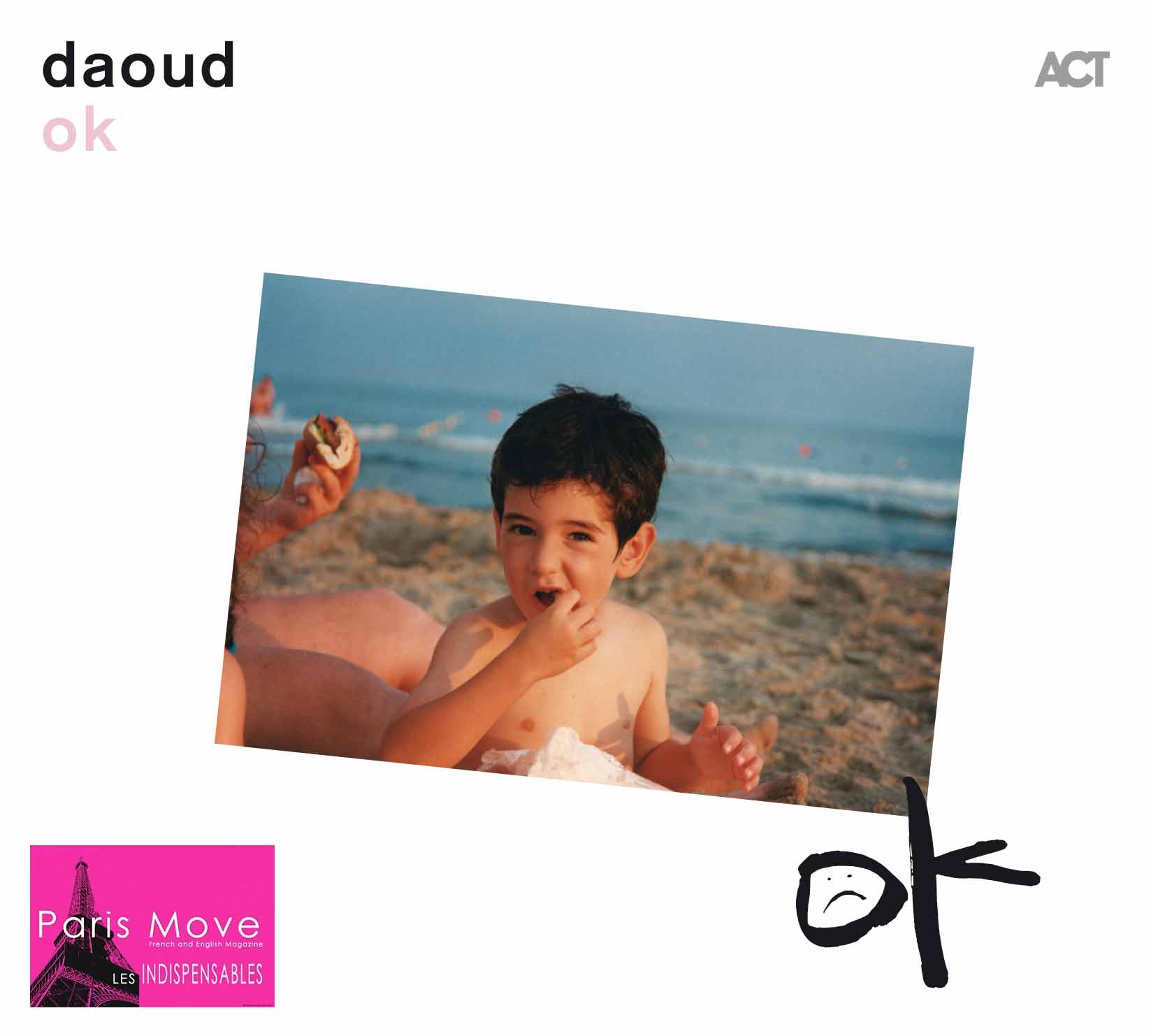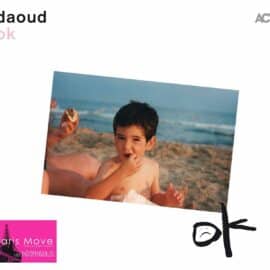| Jazz |

Daoud Is More Than Just “OK”, His New Album Brings Jazz, Funk, and Emotional Complexity Into Focus.
By the time Daoud’s new album ok opens its floodgates, one thing is certain: this artist is not merely experimenting, he’s arriving. Jazz, funk, hip-hop, even hints of rock and Afrobeat, it’s all here, woven not like a patchwork of influences, but like a deeply emotional tapestry. The French-Algerian trumpeter, composer, and self-taught producer has found a new home on the prestigious German jazz label ACT, and with that, a new space to assert a sound that’s intellectually layered, emotionally raw, and culturally rooted in both decay and enlightenment.
This isn’t the kind of crossover jazz that strives for mass appeal à la Ibrahim Maalouf. Rather, Daoud offers something darker, subtler, and more introspective, a sonic world where the broken and the beautiful coexist in equal measure. ok stands apart from the cleaner, more polished jazz productions emerging from North America. It carries the raw dust of the European suburbs, intellectually starved yet spiritually searching. It’s a record that’s as much about disillusionment as it is about resilience, not just in theme, but in structure, sound, and attitude.
Daoud describes the album as “built entirely around the concept of reluctant acceptance of things we can’t control. Well, too bad, I guess.” The tone is ambivalent, at once defeated and defiant. Over the course of 14 tracks, he explores failure, loss, repetition, and the absurd ritual of pretending everything is fine. It’s an album made of contradictions: satire and sincerity, joy and sorrow, melody and noise. The emotional tension is palpable, the sound of quietly breaking things, the resilience disguised as routine, the hollow “I’m fine” that rarely means what it says.
There’s a reason this feels so personal yet so resonant. For many Europeans, artists or otherwise, the last fifteen years have carried a heavy psychological toll. The high cost of living, the collapse of long-term perspectives, the endless loop of crisis. For an artist like Daoud, this isn’t a backdrop, it’s a crucible. His response is ok, an album that doesn’t just reflect its time, but processes it. It’s an ode to emotional dissonance: childish glee cloaking adult grief, warm textures hiding cold truths.
Musically, Daoud doesn’t “blend genres”, he repurposes them as emotional textures. Jazz, hip-hop, drum’n’bass, disco, afrobeat: these are not aesthetic experiments, but brushstrokes in a surreal, almost dreamlike narrative. In one moment, you’re caught in a gentle melodic trance; in the next, you’re laughing at a snippet of the French children’s song À la pêche aux moules, cheekily buried inside the frenetic chaos of “ip. A.m”. It’s this constant interplay, between the sacred and the ridiculous, the intimate and the performative, that defines Daoud’s voice.
That duality is visual too. The cover of ok features a childhood photo of Daoud, capturing an innocent vulnerability that permeates the music. The singles’ artwork follows suit, adorned with crude black-marker sketches that evoke a kind of fragile nostalgia, playful, but bruised. The entire project is steeped in impermanence and ambiguity, a bitter-sweet tightrope between delight and despair.
To understand the music, you need to understand the man behind it. Daoud’s life reads like a postmodern picaresque: drifting across Europe and the U.S., sleeping in backrooms, delivering pizzas, working in funeral homes, obsessively boxing and playing football. He quit music several times — not from failure, but from emotional exhaustion. “I think I stopped because it meant so much to me,” he says. “I needed to prove I could exist without it.” But music pulled him back in, and this time, on his own terms. Trumpeter, beatmaker, engineer, composer, all self-taught. “I’m so grateful to be alive in the internet era,” he admits. “If you want to learn, you can learn anything.”
That hunger for creation burns hot. He works up to 18 hours a day, seven days a week. His debut album GOOD BOY (to read, here), released independently in 2024 and recorded in just three days, made a quiet but decisive impact. With it came attention, not just for its genre-defying clarity, but for its emotional transparency. Since then, Daoud has written and produced for pop and hip-hop artists while continuing to craft his own complex voice.
If GOOD BOY was a raw introduction, ok is a refined evolution. He’s not just pushing boundaries, he’s questioning why they exist in the first place. There’s a madness to his method, not unlike fellow French flugelhornist Médéric Collignon, though where Collignon leans into compositional abstraction, Daoud draws his edge from the noisy, uncompromising energy of urban life. He plays with tension the way a clown plays with an audience, a metaphor he claims as foundational. “I’ve been obsessed with clowns since I was three,” he recalls. “I must have seen one playing trumpet on TV and thought, ‘that’s the instrument a clown should play.’” That image, absurd, theatrical, tragic, has defined his relationship with music ever since.
Daoud, then, is more than just ok. He is a singular force carving a new path through modern jazz and beyond. His work is unpredictable, but never careless; eccentric, but never unfocused. He doesn’t chase approval, he creates out of necessity, out of urgency. And in doing so, he gives us something rare: music that reflects what it feels like to live now, not in grand declarations, but in subtle, fractured truths.
Thierry De Clemensat
Member at Jazz Journalists Association
USA correspondent for Paris-Move and ABS magazine
Editor in chief – Bayou Blue Radio, Bayou Blue News
PARIS-MOVE, July 2nd 2025
Follow PARIS-MOVE on X
::::::::::::::::::::::::
Musicians :
daoud: trumpet, flugelhorn, synthesizers, ondes Martenot
Silvan Strauss: drums, percussions
Louis Navarro: double bass
Leo Colman: synthesizers, piano, Fender Rhodes
Jules Minck: synthesizers, electric bass, electric guitar
Quentin Braine: additional percussions
Kuz: additional keyboards, sound design, additional production
Special guests: corto: alto trombone, Mehdi Nassouli: guembri, Charlie Burg: tenor saxophone, Teis Semey: electric guitar, Kuba Więcek: alto saxophone; Julien Fillion: tenor saxophone; Ludivine Issambourg: flutes; Rosie Frater-Taylor: vocals, electric guitar
Tracklist :
1. Dijon – Daoud
2. Plato s Twins – Daoud
3. La Fièvre (Feat. Mehdi Nassouli) – Daoud
4. L oeil De Jules – Daoud
5. Ame – Daoud
6. 3114 (Feat. Teis Semey) – Daoud
7. Le Bâtard (Feat. Kuba Wiecek) – Daoud
8. Everything But Sex – Daoud
9. Soda (Feat. Julien Fillion) – Daoud
10. Plagiat – Daoud
11. L.p.a.m. (Feat. Ludivine Issambourg) – Daoud
12. Mathilde – Daoud
13. Ck (Feat. Rosie Frater-Taylor) – Daoud
14. Loulou & the Loulous – Daoud

